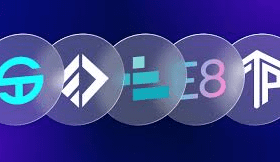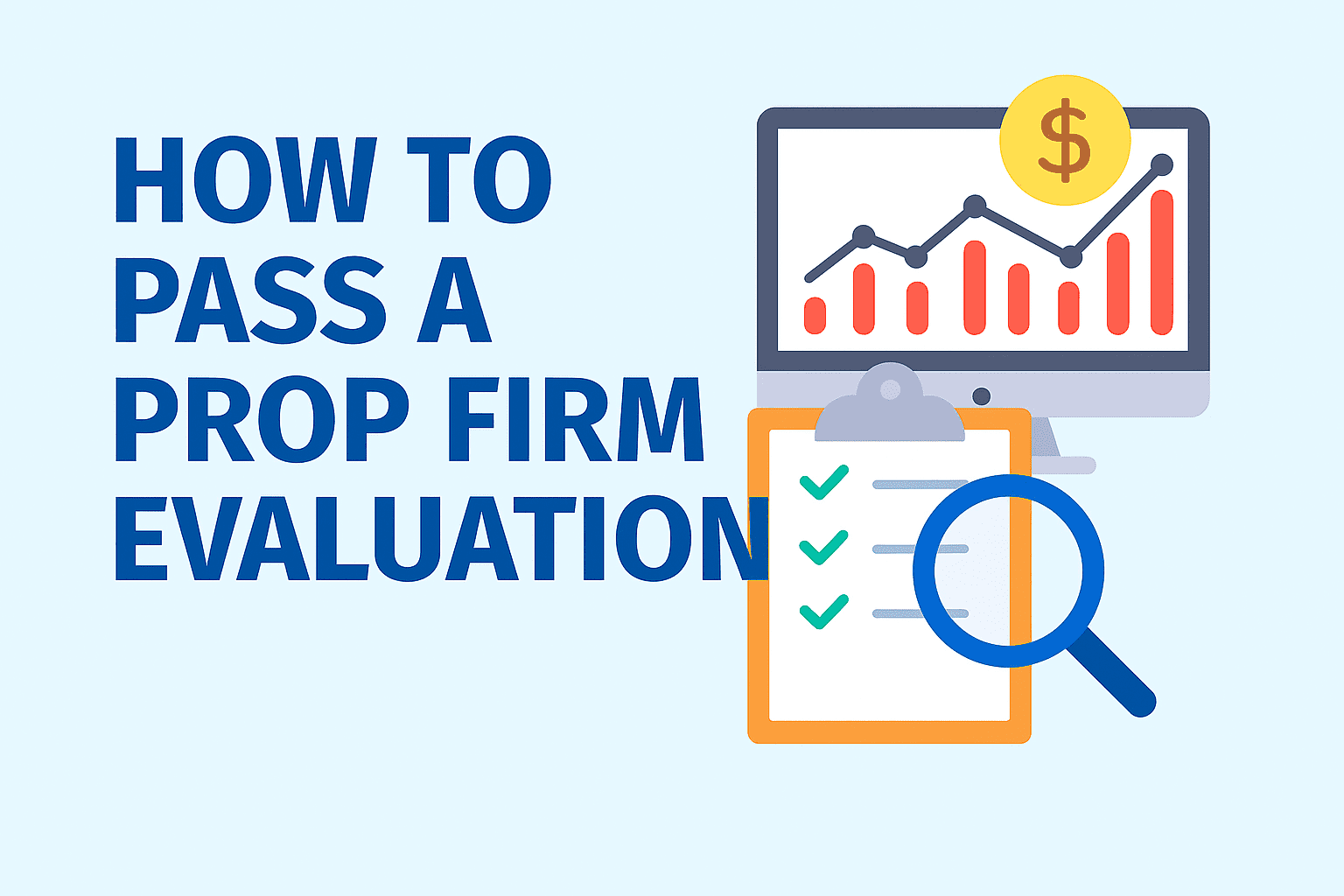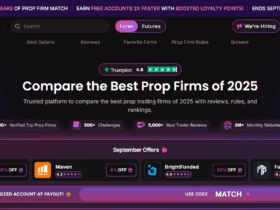In this article, we’ll look at the Future Prop Firm Trends Every Trader Must Watch. Prop firms adopt new and innovative models such as AI risk management, DeFi, and community governance structures.
They enable traders to access and deploy capital, manage risks, and expand profit workflows. Knowing and understanding these innovations is crucial for every trader.
What is Prop Firm?
A Prop Firm, or Proprietary Trading Firm, is an entity that allows traders to utilize its capital to trade different assets, be it stocks, forex, or cryptocurrencies, for the firm’s gain.
Instead of using their own capital, traders can access the firm’s capital, profit profit-sharing agreements being the sole difference. These firms provide adequate training, sophisticated trading instruments, and risk management assistance, which is why they cater to new and seasoned traders alike.
The ability to scale your trading operations without the risk of losing your own money is a huge attraction. There are different operational models a prop firm can adopt. These can range from being fully remote, being based in DeFi ecosystems, or using AI-assisted trading systems.
How To Choose Future Prop Firm Trends Every Trader Should Watch
Focus on AI-Powered Risk Management
- Seek firms utilizing AI technology for trade surveillance, loss minimization, and strategy optimization.
- AI technology can provide real-time alerts with analytics for faster and better decisions.
- Firms with AI risk management systems tend to lower human error and increase consistent profit.
Check for Gamified Trading Platforms
- Certain prop companies have trading interfaces that incorporate game-like elements to boost engagement and enjoyment.
- Systems that incorporate game design elements, such as challenges and leaderboards, can promote better trading.
- Gamified systems frequently have educational resources, enabling players to compete while trading and improving their skills.
Evaluate Multi-Asset Trading Opportunities
- The best future prop firms support trading a combination of instruments, including forex, equities, crypto, and DeFi tokens.
- With newly available positions, profit opportunities increase while risk is spread through diversification.
- Firms that support multi-asset trading tend to provide consolidated research and analytics.
Look for Copy-Trading Capabilities
- Less experienced traders can gain insights by utilizing copy trading software, which replicates the trade actions of a higher-tier trader.
- This can promote faster learning and boost confidence for beginners seeking to advance.
- The best platforms provide strategy transparency along with performance analytics and historical records.
Ensure Compliance with Industry Standards
- To ensure that your capital is safe, pick businesses that work with acknowledged financial regulations.
- Entities that are monitored will provide a greater manner of observation, accounts, and adherence to regulations.
- Attention to regulations and compliance provides a positive reinforcement and deterrent to fraudulent behavior.
Check for Low Fees and Flexible Fee Structures
- Newer prop firms are emerging that have low or even no fees and are not time-restricted.
- More relaxed fees allow for stress-free trading and provide the trader with greater profit.
- Flexible structures enable trading for those who have a full-time job and use it more as a side activity or part-time.
Future Prop Firm Trends Every Trader Should Watch Points
- Multi-Asset Expansion: Trade across stocks, crypto, forex, and DeFi assets within a single platform.
- One-Step & No-Time-Limit Challenges: Access easy evaluation challenges without strict deadlines or multiple steps.
- Instant Funding with Dynamic Scaling: Receive immediate capital with profit-based account growth options.
- Copy-Trading Enabled Prop Desks: Mirror strategies of top traders to learn and earn simultaneously.
- Community-Governed Prop Firms: Participate in decision-making and governance through decentralized community models.
- Brokerless Execution Models: Execute trades directly without intermediaries for faster, cheaper transactions.
- Localized Prop Firms: Access region-specific support, regulations, and trading options tailored to local markets.
- DeFi-Integrated Prop Models: Trade decentralized assets and leverage DeFi protocols for higher liquidity and flexibility.
- Regulated Prop Firms: Trade with firms adhering to financial regulations for safety and credibility.
9 Future Prop Firm Trends Every Trader Should Watch
1. Multi-Asset Expansion
Accessible Cross-Market Trading is becoming the precursor for future proprietary trading firms. Traders can access several financial markets—stocks, currencies, cryptos, and Defi assets—within one platform. It is changing the trading landscape.

It gives traders the ability to avoid concentration risks by diversifying, employing different strategies, and optimizing from trading various markets at the same time.
Future proprietary trading firms will offer advanced analytics, integrated risk and complex trading efficiency tools. For traders, the outcome is the same, more flexibility, the ability to captain their pseudo vessel to more profit, and react more rapidly to changing market conditions, multi-asset expansion is here to stay.
Pros & Cons Multi-Asset Expansion
Pros:
- Includes trading opportunities in equity, crypto, forex, and DeFi.
- Risk mitigation through diversification in stocks, crypto, forex, and DeFi.
- Integrated analytics and single-portfolio management.
Cons:
- Knowledge of various markets is needed, which adds to the learning curve.
- Vortex of information for novices.
- Advanced analytics and management tools come at a premium.
2. One-Step & No-Time-Limit Challenges
One-step & No-Time-Limit Challenges are a game changer in how traders obtain funding from prop firms, making them a prominent emerging trend. While most prop firms use a time-consuming, multi-stage, and multi-evaluation process, these challenges cut the process down to a single step and eliminate time constraints.

This allows traders to focus on the task without feeling rushed. No time restrictions on challenges promote healthy and strategic thinking, reduce the mental burden most traders carry, and permit time optimization.
Flexibility and efficiency offered by these challenges are a prop firm’s most valuable assets. It allows them to expand and reach a wider audience. This is exactly how one-step, no time limit challenges foster consistent profitability in traders. This is exactly how One-Step & No-Time-Limit Challenges are shaping the future of trading.
Pros & Cons One-Step & No-Time-Limit Challenges
Pros:
- Evaluation step is simplified and frictionless.
- Relaxation of the challenge enhances trading.
- Trading is strategic and well thought out.
Cons:
- No time constraint may lessen urgency and motivation.
- Traders lacking discipline may exploit the open challenges.
- Challenges can be removed, which may restrict contest comparisons.
3. Instant Funding with Dynamic Scaling
Instant Funding with Dynamic Scaling is becoming a game-changing trend in prop trading, offering traders immediate access to capital while allowing accounts to grow based on performance.

Unlike traditional models that require lengthy evaluations or fixed funding, this approach provides real-time capital allocation and adjusts account size dynamically as traders achieve profits.
This trend empowers skilled traders to maximize opportunities without waiting for approvals, reduces downtime, and aligns incentives between firms and traders. By combining speed, flexibility, and performance-based growth, instant funding with dynamic scaling is redefining how traders scale their strategies, making it an essential trend for the future of prop firms.
Pros & Cons Instant Funding with Dynamic Scaling
Pros:
- Instant access to funds for trading.
- Accounts can be provisioned to grow based on a trader’s performance.
- No approval wait time increases trading time.
Cons:
- Traders may encounter over-leverage.
- Performance must be consistent to fully utilize scaling.
- Increased risk for traders at the start.
4. Copy-Trading Enabled Prop Desks
Copy Trading Enabled Prop Desks are becoming increasingly popular in the world of prop firms, as they enable traders to analyze the techniques of the most successful traders, all while learning in real-time.
This model lessens the risk for new entrants as they are able to engage new confidently and reduce costly errors. For more seasoned traders, it offers the opportunity to make more income and become more knowledgeable as they share profitable strategies and techniques.

Offering learning, visibility, and profit, copy trading excels in improving community saturation and skill improvement. Improved community saturation and skill enhancement are impressive attainments.
This newly advanced method positions copy trading as a trend not to be ignored, promoting efficiency and development in the ever-changing world of trading.
Pros & Cons Copy-Trading Enabled Prop Desks
Pros:
- No-risk learning opportunity for novices.
- Strategy monetization for skilled traders.
- Encourages collaboration and engagement in community activities.
Cons:
- Novices may rely too much on the strategies of other people.
- Results from strategies that are copied cannot be ensured.
- May stifle the ability to think creatively or make decisions alone.
5. Community-Governed Prop Firms
Community-Governed Prop Firms are transforming the trading landscape by allowing traders to influence how decisions are made, strategies are crafted, and platforms are governed.
Unlike the traditional centralized firms, in these models which are based on decentralized principles, members have the right to vote on important issues such as risk levels, funding guidelines, and feature enhancements.

Such models cultivate openness, trust, cooperation, and ownership. With community growth and firm growth aligned, the model fosters a sense collective responsibility.
Given the preference from traders for platforms that embrace participation and equity, community-governed prop firms represent the emerging new standard for prop trading.
Pros & Cons Community-Governed Prop Firms
Pros:
- Boosts trust and confidence in the system.
- Gives traders the right to dictate the changes in the regulations and the elements of the system.
- Fosters shared accountability and creativity.
Cons:
- Slower pace of important decisions because of the need to vote.
- Members may have conflicting interests.
- Members may be unwilling to participate.
6. Brokerless Execution Models
One of the most recent innovations in prop trading is the development of Brokerless Execution Models. When traders place market orders without entering a trading fee negotiation with a third party, the fee is eliminated.
Additionally, the unnecessary time taken by intermediaries is cut while trade execution is performed with certainty.

Such a system is more secure, having no third parties that could compromise the trade, or take, counter the risk of the trade.
With the increasing need for streamlined processes, these models have become the most trading prop firms release to their traders. Brokerless execution prop models empower traders where most firms have limited levels.
Pros & Cons Brokerless Execution Models
Pros:
- Less fees that are required in trades.
- Execution of tasks is faster, clearer, and more immediate.
- Counter party risks are lower.
Cons:
- Need to have competence on the technical side of order management.
- Very little assistance on the account management side.
- Certain markets have challenges regarding liquidity.
7. Localized Prop Firms
Localized Prop Firms focus on providing specific trading services for training and trading within certain geographical areas. They are getting customized to particular market conditions, regulations, and trading cultures.
Different from global-only firms, regionally specialized firms offer specific region training and support, which resonate with local traders. This specialized focus mitigates complex regulations and builds communities around traders within specific regions.

These firms provide reinvented tools for traders, capturing valuable shifts within specific region market behaviors.
As the trading world continues to broaden, these firms are becoming the most relevant and compliant trends, and offer community-driven advancements as well. Situated within the compliance landscape, these firms are closing the inequality gaps faced by communities.
Pros & Cons Localized Prop Firms
Pros:
- Services and support are more tailored and specific to the needs of regional traders.
- Local laws and regulations guarantee security.
- Community building is made easier.
Cons:
- May have little to no trading opportunities with the rest of the world.
- May be too regionally focused which can have poor diversification.
- Restricted tools that may have less advanced features in comparison with global systems.
8. DeFi-Integrated Prop Models
DeFi-Integrated Prop Models are revolutionizing the future of trading by combining proprietary trading with DeFi protocols. These models enable traders to engage with liquidity pools, yield farming, and tokenized assets without leaving the prop firm ecosystem.
With DeFi, firms achieve faster settlement times, reduced costs, and unambiguous operations via the blockchain.

While using firm capital, traders can access new opportunities in decentralized, non-traditional, cross-asset markets in addition to the firm’s proprietary assets..
This culture shift provides traders new and transformative DeFi market access. DeFi’s growth makes DeFi integrated prop models a pivotal market trend geared towards redefining the prop trading of the future.
Pros & Cons DeFi-Integrated Prop Models
Pros:
- Trade with decentralized liquidity and with tokenized assets.
- Enhanced speed of settlements and reduced fees through blockchain technology.
- Venture into cutting-edge DeFi products.
Cons:
- Understanding and liquidity conversions could pose a risk.
- Risk of exposure to smart contract bugs.
- Some of these offers might be illegal in certain jurisdictions.
9. Regulated Prop Firms
Combining job possibilities and legal compliance and safety, Regulated Prop Firms– which are trading companies that hire traders– are becoming a significant trend for the upcoming future of onsite and remote closing of trades.
They are protected by law and follow protocols that allow for ethical and transparent practice, as well as the safeguarding of traders’ capital.

Absorbing well-documented risk and offering consistent and predictable capital covering for trading, protected trading firms attract participants and traders of all experience tier levels.
Keeping fraud and mismanagement safe and sound, regulated prop firms are actively reducing the risk. They are a trend that must not be ignored.
Pros & Cons Regulated Prop Firms
Pros:
- Legal custodial arrangements and customer capital protection.
- Trust building and risk credibility enhancement with the traders.
- Decreased chance of fraudulent activity and poor risk management.
Cons:
- Trading strategies might be monitored.
- Compliance might extend the periods of customer onboarding.
- Some advanced methods of trade might be restricted.
Benefits Of Future Prop Firm Trends Every Trader Must Watch
Trading Tools and Technologies
- AI Powered trading tools and risk management tools and multi asset tools are being provided.
Flexibility
- Trading at one’s own pace with the one-step challenges, no time-limit evaluations and instant funding.
Profit Maximation
- Multi asset trading, dynamic scaling and copy trading provides efficient ways to profit.
Lowering Risk
- Trading with regulated firms and AI Risk management protects your trade and loss.
Skill Improvement
- The use of copy trading, gamified risk management and community governance provides continuous improvement.
Wider Access on Trading
- Location and DeFi integrated models permits wide region and decentralized market tradi.
Lower Cost on Trading
- Brokerless trading with minimal fee models improves your profit as your trading cost are reduced.
Conclusion
To sum up, changes in prop trading are influenced by multitasking assets, artificial intelligence in risk management, and Community Defi governance which fosters quicker capital access, streamlined trading, improved educational resources and protection in an open trading environment.
One-step challenges, copy trading, and proximity platforms work in traders’ favor because risk is limited. Anyone intending to prosper in contemporary trading must understand emerging prop trading firm trends which polish trading and firm strategies and equip traders for future fast-moving technologically advanced markets.
FAQ
Future prop firm trends are emerging practices and innovations in proprietary trading, such as AI-driven risk management, multi-asset trading, DeFi integration, and community-governed models, that are shaping the next generation of trading platforms.
Traders should watch these trends to gain access to advanced tools, faster funding, lower risk, enhanced learning opportunities, and the ability to scale profits efficiently in a rapidly evolving market.
It allows traders to access multiple markets—stocks, forex, crypto, and DeFi—on a single platform, enabling diversification and higher profit potential.











Got a Questions?
Find us on Socials or Contact us and we’ll get back to you as soon as possible.